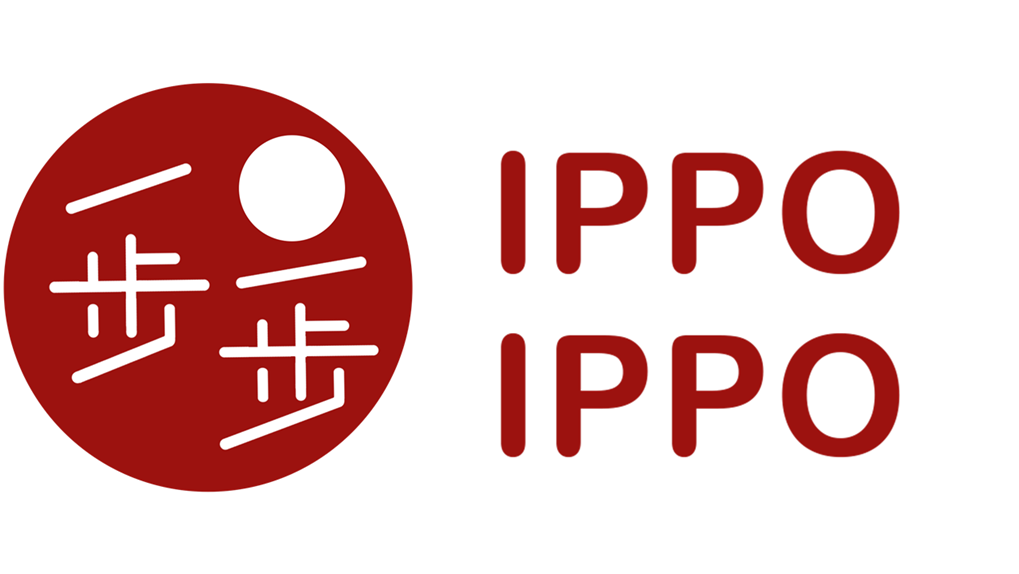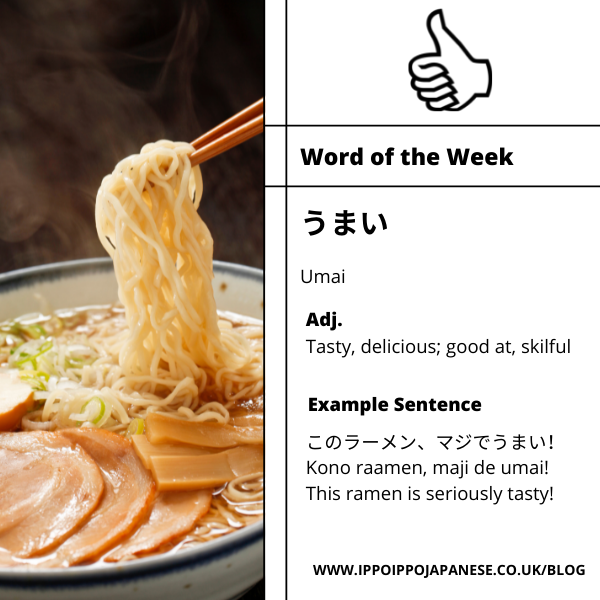Posted: 3rd November 2022
Hello and welcome to the Ippo Ippo Japanese Word of the Week!
This Week's Word Is...
うまい (umai)
Before We Begin
None of the links in this post are affiliated, which means I don't make money via companies like Amazon when you click on them. If you'd like to support the blog with a donation (however small!), you can do so via Ko-fi.
What Does うまい (umai) Mean?
うまい (umai) has two main meanings:
- Tasty, delicious
- Good at, skilful
Meaning #1: Tasty, Delicious
Possibly the most common way you'll hear うまい (umai) being used is to mean the same thing as the word おいしい (oishii): delicious!
If you know a bit of Japanese already, you most likely have come across the phrase:
- おいしいですね!(Oishii desu ne - This is delicious!)
Or simply:
- おいしい!(Oishii! - Yum! / This is great!)
Fun fact: the first Japanese restaurant I ever went to was a tiny place called Oishii, located on Rose Street, Edinburgh. It no longer exists, but I probably owe them a pretty big debt for getting me (a formerly very non-adventurous eater) into Japanese food all those years ago!
So: why would you use うまい (umai) instead of おいしい (oishii)?
First of all, うまい (umai) is often considered somewhat "rougher" than おいしい (oishii). As such, おいしい (oishii) is the safer choice in polite company, and what's more, it's slightly more common for men to say うまい (umai) compared with women. (Note: this of course is heavily bound up in traditional gender roles. As with all my students, I encourage you to not worry too much about these old-fashioned ideas and instead follow what you're comfortable with!)
In recent years, うまい (umai) has come to be used by all sorts of people, and I would challenge anyone watching a food programme on Japanese TV to get past more than 10 minutes without hearing someone exclaim うまっ!(uma—!).
If you're not sure how this うまっ!exclamation should sound, I highly recommend checking out the following Dogen video (shown below) on "SUPER Advanced Japanese". In this video, the very first section takes you on a quick journey through the following phrases:
- とてもおいしいです (Totemo oishii desu - This is very tasty)
- うまいですね (Umai desu ne - This is amazing)
- なにこれうまっ (Nani kore uma—! - "What is this?! It's amazing!"*)
*Or in Dogen's words: "HOLD UP".
Of the above three options, I (like Dogen) would suggest avoiding the first one, as it sounds quite flat and robotic. If you want to use おいしい (oishii), either give it as an exclamation (おいしい! - oishii!) or with a nice friendly ね (ne) on the end: おいしいですね (oishii desu ne).
Notice: おいしいですね (oishii desu ne) is basically the same as the second option (うまいですね - umai desu ne) listed above. However, as we've just learnt, using うまい (umai) gives a slightly rougher feel to this sentence.
In the video, the third phrase introduced by Dogen is a very common exclamation used pretty much reflexively by many Japanese speakers: 何これうまっ (Nani kore uma—!). This final expression is one I'd say is best used among friends, as it's very casual, especially in how うまい (umai) is shortened to うまっ (uma—!).
Meaning #2: Good At, Skilful
The second meaning of うまい (umai) is another one you'll definitely come across if you spend any significant length of time in Japan.
There are a few different ways of saying that someone is good at something in Japanese, the most common being:
- 上手ですね (Jōzu desu ne - You're good at ___!)
This is a phrase which has come to strike fear (among other emotions) into the hearts of many Japanese learners, as it's often used by random people (from teachers and friends to shopkeepers and friendly neighbours) to complement a person's Japanese skills. While it can be nice in the early days to hear someone say 日本語、上手ですね (Nihongo jōzu desu ne - Your Japanese is great!), it can become quite grating as you start to realise that a) you actually have a long, long way to go with your Japanese and b) no matter how long you live in Japan (and how good your Japanese gets), you're likely to keep on getting this compliment, which - no matter how well intentioned - can ultimately be quite othering.
It bears mentioning that as much of a pain this is for learners who have grown up speaking a language other than Japanese, another group greatly affected by being "nihongo jōzu'd" is those who have grown up speaking Japanese as a first language, but who are frequently mistaken for learners or visitors to Japan due to not looking stereotypically Japanese.
If you're curious to find out more on this topic, I recommend seeking out videos such as the following interview with Tiffany Rachel, a black woman who was born and raised in Japan.
As you may have gathered, 上手 (jōzu) is generally used to compliment others. For example:
- イラストが上手でうらやましい (Irasuto ga jōzu de urayamashii - I'm jealous of how good [your] illustration skills are)
- 片付け上手な人は尊敬できる (Katazuke jōzu na hito wa sonkei dekiru - I respect people who are good at tidying up)
- やっぱり包丁使うの上手だね!(Yappari hōchō tsukau no jōzu da ne! / Just as expected, your knife skills are great!)
Note: as all of the above sentences are phrased casually, you might notice that they drop quite a few particles like を (wo) and が (ga). When it comes to sitting tests, don't forget that 上手 (jōzu) is most commonly preceded by が (ga)!
Getting back to our Word of the Week: うまい (umai) is similar to 上手 (jōzu) in that it's often used to compliment others. For example:
- 彼女は背は低いけど、バスケットボールがうまい (Kanojo wa se wa hikui kedo, basuketto bōru ga umai - She's short, but she's good at basketball)
- 彼は歌がうまいです (Kare wa uta ga umai desu - He's good at singing)
Like with うまい (umai) meaning "tasty, delicious", うまい (umai) meaning "good at" is a bit more of a casual option, often used between friends.
So what if you want to describe your own skills? Fortunately there's a word you can use for both others and yourself: 得意 (tokui).
- 喋るより聞く方が得意なんです (Shaberu yori kiku hō ga tokui nan desu - I'm better at listening than speaking)
- 彼は謎のあだ名をつけることが得意です (Kare wa nazo no adana wo tsukeru koto ga tokui desu - He's good at giving people weird nicknames)
Incidentally, 下手 (heta), the word for "bad at", can also be used for either yourself or others.
うまい (Umai): How to Write it in Kanji
So far, we've only seen うまい (umai) written in hiragana. However, there are in fact kanji you can use to write this word!
As with many other words in Japanese, there are several different kanji you can use depending on the nuance you want to express. While there is a bit more depth and variation to this than can be covered in this blog post, I've broken things down into some broad rules.
First: to give the meaning of "good at, skilful", the kanji you want is 上手い。You may notice that this is in fact the same kanji as in 上手 (jōzu) - just with an い (i) tagged on at the end!
Second: to express the meaning of "tasty, delicious", there are two options.
- 旨い
- 美味い
Why, you ask?
The short answer is that while each of these two options contains minor differences in nuance, they are essentially interchangeable.
Interestingly, 美味い uses the same kanji as can be used for おいしい (oishii), which you can also write as 美味しい。It is also said to be a more recent way of writing うまい (umai) using kanji in comparison with 旨い, and is in fact believed to be ateji (search "ateji" in this Tofugu article for more info on this subject).
Bonus Note: Umami
Feeling hungry?
I thought I'd end today's post with one final tidbit for all you foodies out there.
If you're at all into cooking, you're likely to have come across the word "umami". This word, which represents a concept originating from Japan, actually uses one of the kanji we've just seen: 旨味!The 味 (mi) in "umami" means "flavour" and is read as "aji" when on its own.
The history and science of umami are actually pretty interesting, so if you haven't come across it before, definitely feast your eyes on this bite-sized intro, courtesy of Tofugu.
Sources & More Info
- 千駄ヶ谷日本語教育研究所:日本語の美しさ8
- 違い比較辞典:「上手い」と「美味い」と「旨い」の違いとは?分かりやすく解釈
- 毎日のんびり日本語教師:「得意」と「上手」の違い
- HiNative:「上手い」を含む文の意味
- 贈る言葉情報館:「旨い」と「美味い」の違いを解説!実は使い分けが必要だ!
You've reached the end of this post! I hope you enjoyed it.
For updates on posts like this sent straight to your inbox, sign up to my newsletter (sent no more than once a month):

Support Me on Ko-fi
If you've enjoyed this post and would like to see more like it in future, please consider sending a donation - however small! - via Ko-fi. I don't include any affiliated links or ads on my blog, so every little helps!
Please donate via the portal below or by going directly to the Ippo Ippo Japanese Ko-fi page.







